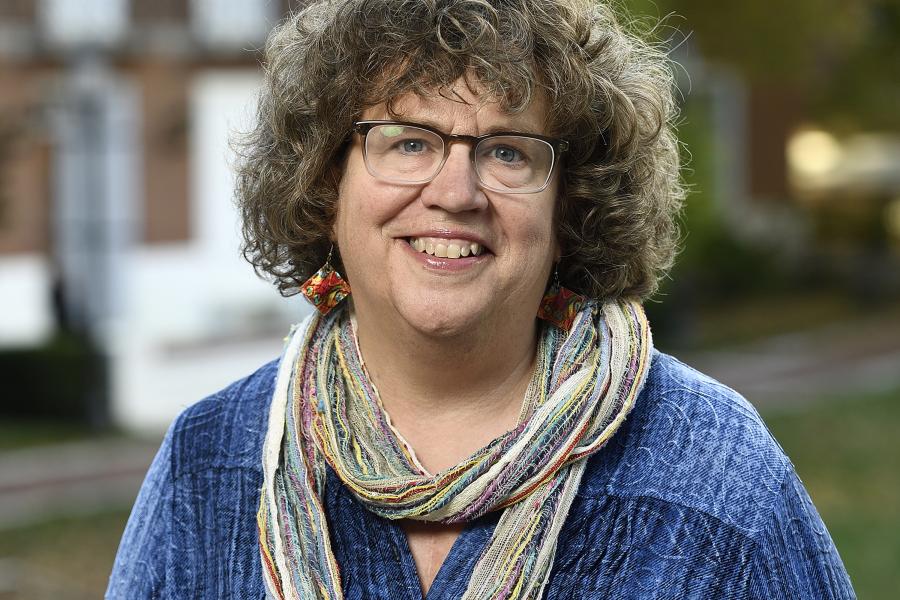Before she even had the vocabulary to describe what she was feeling, Kim Sütter knew seeing others in distress caused her pain. At 5 years old, she witnessed a kindergarten classmate throw a toy—a rubber knife—and remembers his tears when it was confiscated by their teacher.
"He cried and cried and cried, and his cries went deep down into my soul," Sütter says. "And I wanted to fix it. I wanted to help."
Her solution—to bring the boy the gift of a serrated knife from a box of discarded kitchen cutlery in her parents' basement—didn't help matters, and her own knife was also confiscated. When her exasperated mother asked why she had taken a knife to school, Sütter couldn't give an answer.
"I didn't have the words to explain that his pain affected me," she says.
Sütter's capacity for empathy would propel her to a career of over 30 years in crisis response and therapy, helping people during some of the most difficult moments of their lives. But her mission, she says, is to make sure more people understand that it's never too early to ask for help.
It's a message Sütter shares with the people she sees through her work with the Johns Hopkins Behavioral Health Crisis Support Team, a pilot program that pairs trained clinicians with public safety personnel to provide in-person support to people in crisis. No day is typical for the six-person team, Sütter says, but the work is a powerful reminder of the importance of leading with empathy.
"I think why I love my job is that you do get to provide compassion and clarity to someone who's having a really difficult day," she says. "And there are so many reasons that people have difficult days—we all have them. So to be with someone on that day and make it maybe a little bit better is, I think, a really satisfying part of crisis work for me."
The BHCST, launched on a limited basis at the university's Homewood campus in 2021 and expanded to the Peabody campus in the fall, is part of a multi-faceted strategy to ensure the safety and well-being of the Hopkins community, including residents in the neighborhoods surrounding the university's campuses. The team is dispatched via its own newly launched crisis hotline—410-516-WELL (9355)—or through calls to Public Safety if the request includes a behavioral health component.
While the BHCST is for urgent issues requiring an immediate, on-site response, Sütter urges students to reach out and open "whatever door is comfortable to you." There are a range of mental health services available to the Hopkins community, on the phone and in person 24/7. And while talking to mental health professionals can be an important step to feeling better, she says, speaking with a professor, an adviser, or even a peer can help unlock perspectives and avenues for help.
Requests take many shapes, Sütter says, and sometimes include a call to check on someone's well-being or a report of someone having an immediate mental health crisis. There's no one-size-fits-all when it comes to crisis response work. "There isn't a playbook for crisis work, but there are some bedrock principles," Sütter says. Regardless of the reasons, a person in distress has had their coping mechanisms temporarily overwhelmed, she explains, and it is the job of the clinician to assess the situation with a clarity that the person in crisis may not have.
"We're asking specific questions so we can understand their history, understand what contributed to their distress, and try to work with them on a plan for the next steps," Sütter says. "There is a lot of room for self-determination and for customization. We want to determine what is helpful to you? What does true support look like for you in the next couple days?"
That collaboration with the person in crisis is key to the program's mission and to its success. It dispels harmful myths about crisis response—especially the misconception that calling for help will exacerbate the problem or even introduce new problems such as an arrest or hospitalization. Even in cases where there are risk factors for self-harm, Sütter says the team's guiding principles are to develop the least invasive, most collaborative solutions for the people they see. The data shows the effectiveness of such an approach, she says. "It's been shown in the field that a safety plan and follow-up is more effective in helping people than a trip to the emergency department."
In some cases, the student wants to use their own support system—family, friends, advisors—or the BHCST connects the person in distress to the vast network of campus resources available at Hopkins. When the person in crisis is not a university affiliate, the BHCST connects them with Baltimore Crisis Response Inc. for immediate follow-up care.
Such ample access to resources is part of what attracted Sütter to the job when she first saw a hiring ad in The Baltimore Sun in 2021. "I was sitting on my couch and I literally leapt up and went to the computer so that I could set up a reminder to search for the job alert when it came out," she says. "I just thought I really want to do this because it's an opportunity to apply these skills that I have in crisis intervention but in a completely different environment."
Sütter enjoys the team aspect of the job. "The BHCST clinicians have a great diversity of experience, in ED and hospital work, foster care, crisis hotlines, and therapy with troubled teens," she says. "We all have a lot we can learn from each other."
The vast majority of calls the BHCST fields involve students, and the team helps connect them to the broad scope of campus-based services that can support them in the days and weeks after a crisis. Sütter says the university setting is a uniquely resource-rich environment for students in distress, and that there is a vast network of support staff invested in every student's success and well-being.
The university-based crisis support team represents a shift in how institutions of higher education approach public safety, but for Sütter, it's yet another role in a career spent at the vanguard of crisis response programs. In 1985, she joined one of Maryland's first-ever mobile crisis units, located in Montgomery County. She later taught crisis intervention training at a county police academy, and she sees these programs as enhancing vital collaborations between public safety and mental health professionals.
"You're respecting the dignity of each person in distress and giving them that self-determination that, even in a crisis, they may know some things about themselves that are significant," she says. "It's really important that the people we see know that there's someone that cares about them. That they matter. That the things that are upsetting and distressing to them matter, and it's OK to need help. It's OK to talk to somebody."
Posted in University News
Tagged public safety









